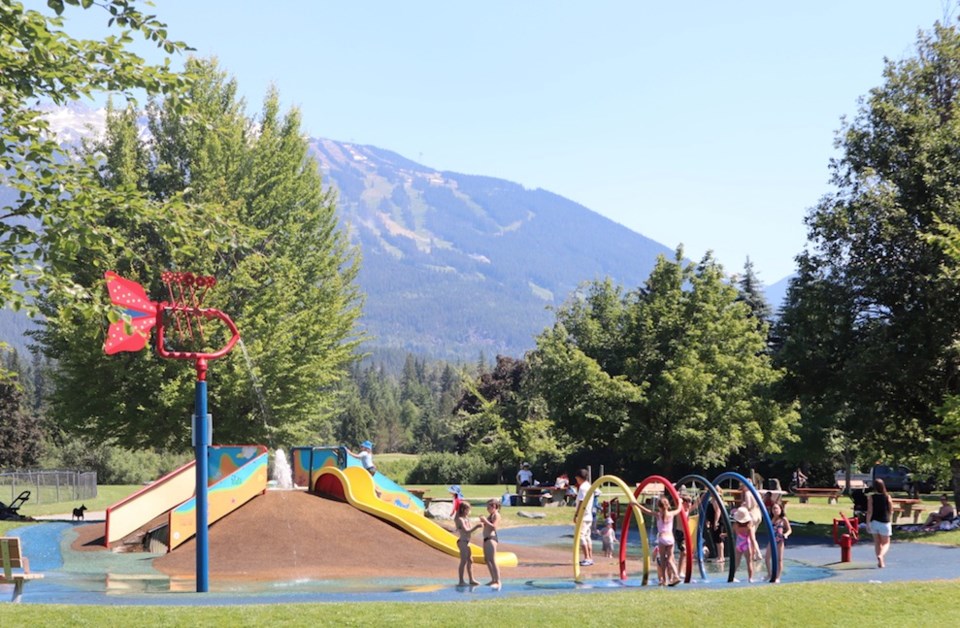A weekend of record-breaking heat in B.C. and Whistler extended throughout the week after wreaking havoc on river levels in Pemberton and impacting water quality in Whistler.
Highs of 38 degrees in Whistler on Saturday, June 26 and 40 degrees on Sunday, June 27—the highest ever recorded in the resort for either day—climbed to 41 degrees on Monday and 39 degrees on Tuesday—well above the historical average June high of 23 degrees.
And on Sunday, June 27, Lytton, B.C. recorded a high of 46.6 degrees—the highest temperature ever recorded in Canada, beating a record of 45 degrees set in Midale and Yellow Grass, Sask., in July of 1937.
The new record lasted until Tuesday, June 29, when temperatures hit 49.6 degrees.
The intense heat led to rapid runoff in rivers and streams throughout the Sea to Sky, prompting an evacuation order in parts of the Village of Pemberton and Area C of the Squamish-Lillooet Regional District (SLRD).
At press time, both orders had been rescinded (find the latest at pemberton.ca and slrd.bc.ca).
The runoff led to a mandatory portage on the River of Golden Dreams, while also creating problems with Whistler’s water quality. On June 27, the Resort Municipality of Whistler (RMOW) and Vancouver Coastal Health (VCH) issued a water quality advisory for Whistler properties, with the exception of Emerald Estates and Cheakamus Crossing. The advisory was prompted by turbidity (or cloudy water) conditions in Whistler’s biggest water source, 21 Mile Creek. Rapid snow melt, a result of the record-breaking heat, pushed the creek’s water conditions past the normal shut-off criteria.
While the risk to consumers is low, officials are advising some locals and visitors—particularly those with weakened immune systems—to bring tap water to a full boil before drinking it, or using it to wash fruits and vegetables, brush teeth or make ice. Alternatively, bottled water can also be used.
The advisory will remain in place until further notice.
The RMOW opened the Meadow Park Sports Centre as a cooling centre on June 28 and 29 and offered free public skate sessions, including rentals, to help locals and visitors keep cool, while local hotels also did what they could to help out.
“The lobbies are largely open, [and] they are air conditioned,” said Saad Hasan, president of the Hotel Association of Whistler, adding that COVID-19 protocols like masking and physical distancing remain in place.
“Some hotels are doing freezies, other hotels have set up sprinklers outdoors for children to cool down.”
Hotels were also offering bottled water to guests in light of the boil water advisory, as well as offering shuttles to the lakes on request.
While BC Wildfire was reporting no recent fires in the Whistler area at press time, Whistler’s fire danger rating climbed to extreme on June 28, where it was forecasted to stay for at least the next four days.
Prior to the record-breaking heat wave, the RMOW offered some tips to keep cool in the resort, including: visiting one of Whistler’s quieter parks to spend time in the shade (find one at whistler.ca/parks); heading to the library where the 30-minute “express” visits have been lifted (though mask rules are in place); visiting the Audain Art Museum or the Squamish Lil’wat Cultural Centre; hitting up the spray park at Meadow Park from 9 a.m. to 8 p.m.; and soaking up the shade at Whistler Olympic Plaza.
According to Whistler’s Dr. Karin Kausky, the heat wave is not the time to exert yourself.
“Use common sense,” she said. “If you’re ever going to give yourself a day off, this would be it. We underestimate how much this heat impacts us. If you’re going to [exercise], do it with someone and not too far from medical help. If something happens while you’re exercising, you have less reserve for managing those injuries.”
It’s also important to understand various heat-related illnesses and how to treat them. They range from minor issues like heat rash and sunburn to more serious problems like heat exhaustion and heat stroke.
“Heat stroke is a medical emergency,” Kausky said. “You dial 911.”
While the risk of heat-related illness varies from person to person, it’s important to look out for young children, seniors, people with underlying health issues and vulnerable populations.
Whistler Community Services Society’s (WCSS) outreach team was also out in the community throughout the week to check on people, particularly those who are homeless or living in less-than-ideal situations.
Living in your car or outdoors can be particularly challenging right now, Jackie Dickinson, executive director of WCSS said. If someone needs to access the nearest shelter in Squamish, WCSS can provide free transportation.
Whistler Animals Galore also reminded pet owners via Facebook to make sure their pet is kept cool and has access to shade and water in the heat. Limit their exercise and never leave them in a vehicle.
- with files from Alyssa Noel and Megan Lalonde.




